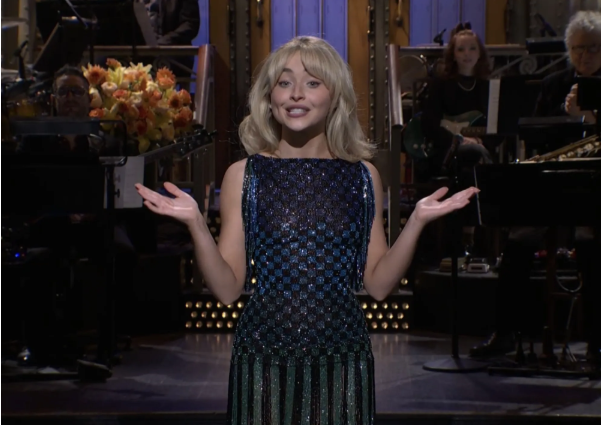TV
Sabrina Carpenter’s SNL Debut: F-Bombs, Censorship & Live TV’s Fine Line
1. The Big Night: Host + Musical-Guest Double Duty
On October 18 2025, pop star Sabrina Carpenter took on a rare double role — both host and musical guest of Saturday Night Live. This marked a major milestone in her career, as few artists are ever given the chance to both host and perform on the same night. From her sharp comedic timing in sketches to her soulful live performances, Carpenter’s episode was already destined to draw attention. But one particular moment — an uncensored lyric — turned her night into one of the most talked-about SNL events of the season.
During her performance of the song “Nobody’s Son”, Carpenter sang the explicit lyric “He sure f*ed me up”** twice. What made this noteworthy was that some viewers heard the line completely unedited, while others heard silence or a muted drop during the same moment. East Coast audiences experienced the live feed in full, but by the time the episode aired on the West Coast, the F-words had been muted.
This wasn’t a simple slip — it revealed a complex interplay of live broadcast timing, regulatory policy, and artistic choice. For Carpenter, the moment served as both an emotional high point in her performance and a statement about authenticity. For the network, it raised eyebrows about how far live television can go in 2025.
Performing live on SNL is a daunting task for any artist. The dual responsibility of hosting and performing means balancing comedy, music, and audience engagement — all in real time. Carpenter managed the balance gracefully, weaving humor into her monologue while delivering passionate, polished performances. Yet, it was that one unfiltered lyric — raw, emotional, and unmistakably real — that truly defined her night.
For many, Carpenter’s choice to sing the lyric uncensored wasn’t about shock value. It was about emotional honesty. The lyric reflects the pain and chaos of heartbreak, and censoring it might have diluted its impact. Whether intentional or spontaneous, the decision showcased Carpenter’s growth into a mature artist unafraid to speak her truth — even on national television.

2. The Censored Word: Time-Zones, Platforms & Rules
The reason why some viewers heard the F-bomb while others didn’t comes down to the intricacies of live broadcasting. Saturday Night Live airs live in the Eastern time zone, but is delayed for others. This means East Coast viewers see it as it happens, while the West Coast sees a slightly edited version. During this delay, networks often make real-time adjustments — especially if something controversial happens in the live feed.
The Federal Communications Commission (FCC) still enforces rules about what can and can’t be said on public television. While these regulations have loosened slightly over time, words like “f***” remain among the most restricted. Even though SNL airs after 11:30 p.m. — a slot technically outside the “family viewing” window — local affiliates often choose to play it safe to avoid potential fines. As a result, when Carpenter sang the lyric live, the East Coast audience got the unfiltered version, while affiliates in later time zones muted those moments.
Streaming services complicated matters even further. Some streaming viewers reportedly heard the full lyric, while others did not, depending on how their feed was sourced. The fragmentation of modern television means there is no single version of “live TV” anymore. Instead, viewers experience slightly different versions of the same event depending on where and how they’re watching.
This fragmentation speaks volumes about how media control and censorship have evolved. Unlike the 1990s, when an F-bomb on network television would result in swift backlash and possible bans, the modern landscape is more nuanced. Networks know that social media will amplify such moments, often turning potential controversy into viral marketing. The SNL team may have anticipated that risk — and even embraced it.
Interestingly, Carpenter had shown awareness of the issue earlier in the episode. During her first performance, she self-censored another song lyric, replacing the full word with “F my life.” This suggests she knew where the line was — and chose to cross it later, perhaps intentionally, as a creative or emotional decision.
The fact that her second performance aired differently across platforms demonstrates both the power and the chaos of live television in the digital age. It also illustrates a deeper question: in a world of streaming, where explicit content is common, how relevant are broadcast censorship rules anymore?
3. The Artist’s Persona & Creative Statement
To truly understand why Sabrina Carpenter’s SNL performance mattered, you have to understand her artistic evolution. She’s no longer the Disney Channel teen star from years past. Over the past few years, she’s transformed into a confident, mature pop artist — one unafraid of exploring themes of love, heartbreak, sexuality, and independence.
Her hosting monologue hinted at this transformation. With humor and self-awareness, Carpenter poked fun at her image, referencing her provocative album cover and the double entendres in her lyrics. Rather than shy away from the public perception of her as a bold and cheeky performer, she leaned into it — turning potential criticism into comedy.
Then came her music performances, which reinforced her authenticity. “Manchild”, her first number of the night, was delivered with poise and theatrical flair. She wore a silk outfit in a minimalist set, blending her sultry persona with playfulness. But when “Nobody’s Son” began, the tone shifted. The performance felt more intimate and vulnerable, showcasing her vocal power and emotional depth.
And then — the lyric. “He sure f***ed me up.” It wasn’t screamed or emphasized for shock. It was sung naturally, in the flow of the song, capturing heartbreak and exhaustion. For anyone who has followed her career, it was a defining artistic moment — one that bridged her past as a polished pop princess with her present as an unapologetically real performer.
This performance was also a declaration of autonomy. By taking control of her language, her presentation, and her tone, Carpenter sent a message: she’s not playing by anyone’s rules but her own. Artists often reach a point where they must break free from earlier expectations. This was hers.
The visual design of the performance supported that message too. The stage setting — simple lighting, moody tones, and Carpenter’s raw expression — stripped away artifice. The song became a vessel for her to confront pain honestly. The explicit lyric didn’t feel gratuitous; it felt earned. It was emotional punctuation, not rebellion for rebellion’s sake.
The incident also highlighted a broader trend in pop music: authentic imperfection. Fans today crave honesty over polish, truth over packaging. Carpenter’s choice to deliver a raw, imperfect, potentially controversial lyric live, knowing millions were watching, was the ultimate act of artistic honesty. It wasn’t about swearing on TV; it was about telling the truth, unfiltered.
4. Audience Reaction & Cultural Conversation
After the episode aired, social media exploded. Hashtags related to Sabrina Carpenter trended across platforms within hours. Fans praised her for being authentic and fearless, while others debated whether the uncensored lyric crossed a line. The split experience — some hearing the F-bomb, others not — became part of the fun and confusion of the night.
Comments flooded Reddit threads and fan forums. Some users celebrated hearing the lyric live, calling it “iconic” and “raw.” Others expressed frustration that their broadcast muted the moment, jokingly referring to themselves as “the censored half of America.” Many pointed out that the inconsistency itself made the night memorable — it created a shared moment of real-time discovery.
Critics and entertainment journalists weighed in too. For some, Carpenter’s SNL appearance marked a defining moment in her evolution as a performer — one that cemented her status among today’s most dynamic pop artists. Others discussed it as a sign of shifting television norms. What used to be taboo on network TV now sparks more curiosity than outrage.
Veteran SNL viewers compared the night to earlier profanity incidents in the show’s history — from Charles Rocket’s 1981 slip to Sam Rockwell’s accidental F-bomb in 2018. But this time, the tone was different. Rather than scandal, the conversation leaned toward admiration and intrigue. It wasn’t rebellion against the system; it was evolution within it.
Younger fans especially saw Carpenter’s unfiltered lyric as a symbol of freedom. To them, it represented the modern generation’s comfort with open expression. They view language differently — less as moral taboo, more as a tool for emotion and storytelling. The generational divide in reaction mirrored broader cultural shifts about art, language, and media boundaries.
For SNL, the buzz was both a challenge and a victory. On one hand, any controversy risks scrutiny from regulators or network executives. On the other, it generated massive attention. Viewership spikes, viral clips, and endless debate are the lifeblood of live television. In the digital era, few moments can capture collective attention the way live, unscripted TV can — and Sabrina Carpenter managed exactly that.
Ultimately, the public conversation that followed reflected how pop culture has matured. People weren’t shocked by the profanity itself; they were fascinated by the interplay between art, censorship, and modern broadcasting. The debate wasn’t about whether Carpenter was right or wrong — it was about what her choice meant.
5. What This Means for Live TV & Artist Platforms
Sabrina Carpenter’s SNL moment offers valuable insight into the future of live entertainment. In an era dominated by streaming and edited perfection, live television still has the power to create moments that feel spontaneous, unpredictable, and deeply human.
For one, it highlights how fragmented media consumption has become. The fact that two viewers can watch the same show and experience it differently — one hearing the lyric, one not — underscores how much the broadcast landscape has changed. The “shared national moment” that defined TV in the 20th century has given way to personalized, varied experiences. Yet ironically, it’s those differences that reignite interest in live shows. People tune in for the unpredictability.
Second, it demonstrates how artists now use live TV strategically. What once might have been seen as a career risk is now a potential branding opportunity. By pushing boundaries in a controlled way, artists can redefine public perception. For Carpenter, the F-bomb incident didn’t damage her image; it reinforced it. It made her appear fearless, authentic, and self-assured — exactly the qualities modern audiences admire.
Third, the moment calls into question the relevance of old censorship rules. As streaming continues to dominate, traditional broadcast standards feel increasingly outdated. When audiences can stream explicit content freely, muting a single lyric on a late-night comedy show feels inconsistent. Networks may need to rethink how they approach live performance content in the coming years.
Fourth, it highlights the balance between spontaneity and control in modern entertainment. Every SNL episode is meticulously rehearsed, yet live TV always holds room for the unpredictable. That’s precisely why audiences still watch. In an age where everything can be edited, filtered, and retouched, moments of real imperfection stand out.
Lastly, Sabrina Carpenter’s performance reaffirms the enduring magic of live television. It’s one of the few cultural spaces left where surprises can still happen, where authenticity can break through the screen, and where artists can connect with viewers in real time. In a world overflowing with content, these moments of shared imperfection — whether they involve a swear word or a spontaneous laugh — are what keep audiences coming back.
Carpenter’s night on Saturday Night Live will likely be remembered not just as a bold artistic statement, but as a moment that reflected the changing face of entertainment itself. It was proof that live TV still matters, that artists still crave real expression, and that audiences still respond to truth — even when it slips past the censor’s button.
From: Candourroyaltees
